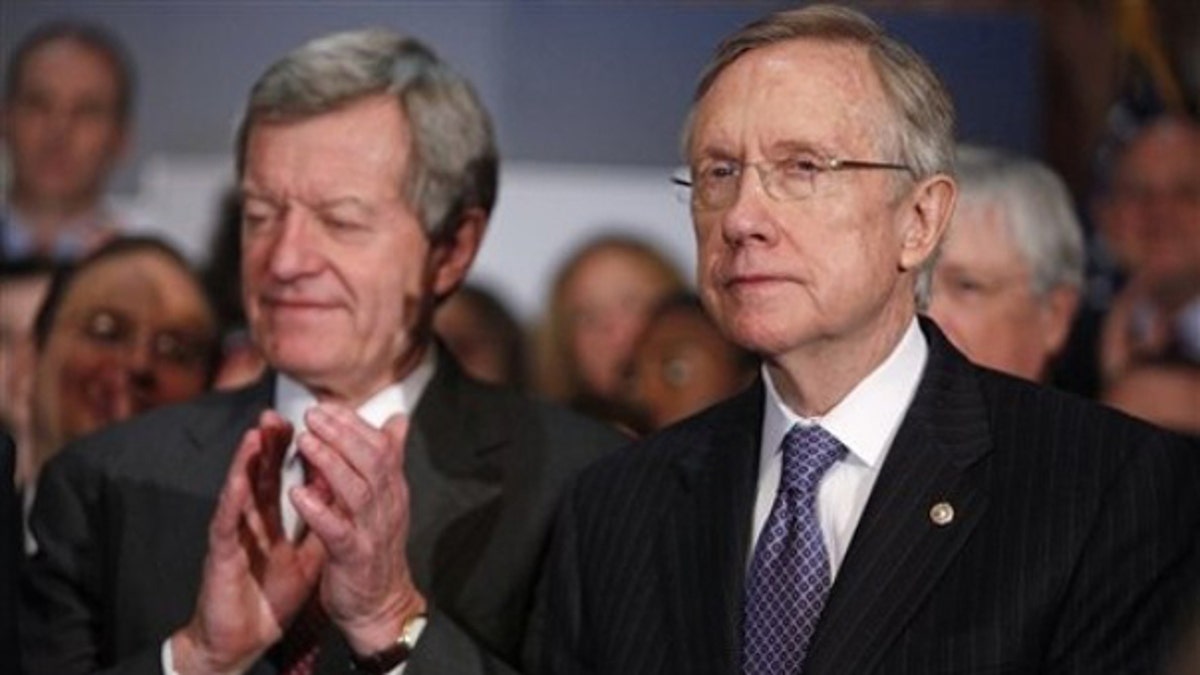
Senate Majority Leader Harry Reid, right, attends a news conference on Capitol Hill Dec. 22, along with Senate Finance Committee Chairman Max Baucus. (AP Photo)
This is the first part of a five-part series on health care reform. Watch "Special Report With Bret Baier" every day this week at 6 p.m. ET for the latest installment in the Health Care Countdown series.
The Senate health care bill could end up hitting middle-class workers hard, through a new tax on insurance plans that could ultimately cut through to their wages.
Both the House and Senate packages will have to be aligned and passed again in both chambers of Congress before a final bill makes its way to President Obama's desk. Both bills raise money for the sweeping overhaul of America's health insurance system by cutting about a half-trillion dollars from Medicare and raising lots of new revenue.
The House bill raises it by imposing a 5.4 percent surtax on people making $500,000 a year or more -- a strictly money-raising move with no impact on health care itself. But the Senate bill raises the biggest chunk of its new revenue through a 40 percent tax on so-called Cadillac health insurance plans -- plans that cost more than $23,000 per family.
And that tax, critics say, will trigger a series of changes that will result in billions of dollars in new taxes on the middle class over the next decade.
First, the tax will hit plans widely used by middle-class employees. The majority of workers with the high-value plans are union members and state government employees who are not considered wealthy, even though Obama advisers like to say the tax is aimed at benefits enjoyed by the likes of Wall Street bankers.
"A lot of those folks that have Cadillac plans have Chevy wages. And that's what makes it, has made it, somewhat controversial and a real issue of contention," said Jim Kessler, vice president for policy with the non-profit think tank Third Way.
Second, some say the tax will make many of the high-value plans too expensive and slowly cause them to disappear -- since employers could wind up cutting back on benefits they offer to avoid any passed-on price increase.
Third, as those union members and other workers lose their health benefits, which are not taxable, the Senate assumes the lost benefits will be replaced by wages, which are taxable.
Christina Romer, chairwoman of the White House Council of Economic Advisers, referred to this scenario during a speech in October, saying workers could end up with more "take-home wages" that are taxed.
"A smaller fraction of your compensation takes the form of health insurance -- you actually see it in your pocket in terms of wages. Of course when you get things in your pocket in terms of wages, you pay taxes on them," Romer said.
In fact, the Senate is counting on raising $120 billion in new taxes over the next 10 years, the majority of which will come from the middle class. Another $30 billion is expected to roll in from the actual tax on insurance plans, but far more comes from wages.
"This is a big tax on the middle class," said Douglas Holtz-Eakin, former director of the Congressional Budget Office, noting that 95 percent of people with the so-called Cadillac plans make under $250,000.
Stewart Acuff, with the Utility Workers Union of America, said the House financing plan is actually "much fairer" since it taps money from the wealthy.
"They got a $2.5 trillion tax cut from President Bush, and asking them to give a little of that back to provide one of the most necessary things in a democracy, which is health care for our people ... is the fairer way to go," he said.
Acuff noted that Obama campaigned against the idea of a tax on insurance plans when Sen. John McCain, his Republican rival, talked about it during the presidential campaign in 2008.
But Obama has since embraced a tax on the insurance plans themselves, and unions are urging Congress and the White House to reconsider.
Fox News' Jim Angle contributed to this report.












































